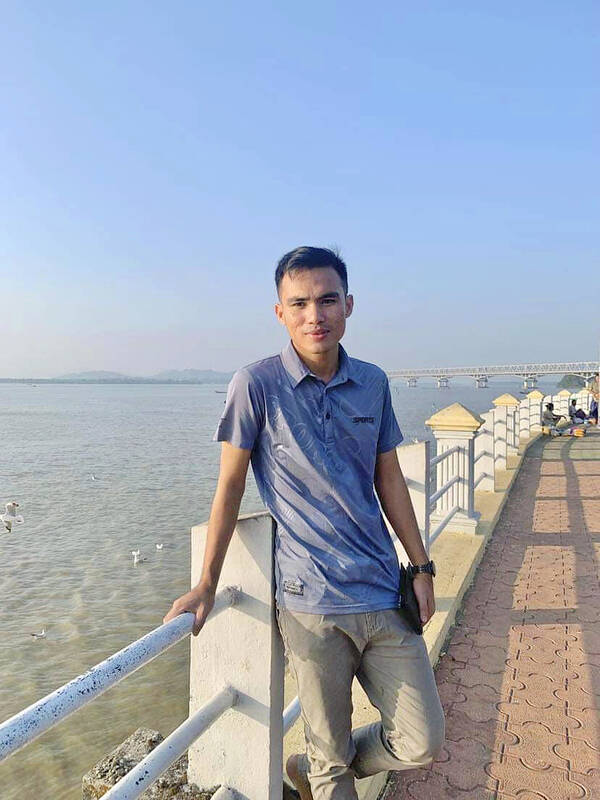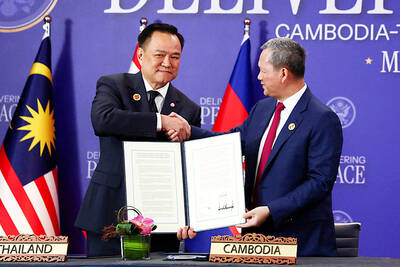This year is already the deadliest since the coup for media operating in Myanmar, with three deaths recorded last month alone as the junta is accused of imposing a “terror campaign” on the press.
Htet Myat Thu, 28, and Win Htut Oo, 26, both freelance journalists, were shot dead during a raid on their home by the military junta on Aug. 21 in the southern Mon state.
In the same week, on Aug. 19, Pe Maung Sein, 50, an award-winning documentary filmmaker, died at a private hospital in Yangon just three days after he had been released from a junta prison.

Photo: AP
Hours of beatings at an interrogation center had left him with five broken ribs and four prolapsed discs, which were untreated for almost two years in jail, where he also endured periods without adequate food.
His wife said he was left paralyzed, and with such severe injuries he was unable to drink, eat or even talk.
In total, four journalists have been killed this year, making it the deadliest for members of the press since the military seized power in February 2021, ousting the government of Aung San Suu Kyi.
The coup was met by widespread opposition from the public, and an armed uprising against the junta.
Journalists documenting the conflict and the frequent human rights abuses by the military, have faced immense dangers.
Hundreds of journalists have also been forced to flee into exile or fled to areas controlled by opposing armed groups, while others work underground.
Pe Maung Sein was arrested in May 2022 while filming in Loikaw, close to the border with Thailand. He wanted to document the conflict and plight of people forced to flee their homes, his wife, Khin Su Naing said.
She said he was kept at an interrogation center where his hands and legs were tied, and he was kicked for hours by a group of soldiers, denied food and allowed only a few sips of water. His memories of what happened next were vague as he lost consciousness. The only thing he remembered was pain.
He was transferred to Loikaw prison, and charged with communicating with blacklisted organizations. He was denied proper medical treatment for his injuries, relying on medicine that his wife sent from Yangon.
When conflict in Loikaw escalated in November last year, Khin Su was unable to communicate with her husband, but learned he had received very little food as the prison had no regular supplies.
He began collapsing from his injuries, and was left paralyzed.
Pe Maung Sein was moved to Loikaw military hospital in April, before being moved again to Yangon, after a request from Khin Su.
Despite being paralyzed, his legs were chained to the hospital bed and he was watched over by armed guards.
Magnetic resonance imaging results showed that he had five broken ribs and four prolapsed discs, while an endoscopic test showed he had a lump in his trachea in addition to bone tuberculosis. He was released four days before his sentence was completed and Khin Su rushed him to a private hospital. He died three days later.
“I had already prepared for him with a wheelchair. I expected him to return home at least as a disabled person, but not like this,” Khin Su said.
Two days after Pe Maung Sein’s death, freelance journalists Htet Myat Thu and Win Htut Oo were shot dead in the country’s south.
On Aug. 21, Thiri Lwin, the girlfriend of Win Htut Oo, received a phone call telling her that gunshots had been heard near the home that her partner shared with Htet Myat Thu in a small town in Southern Myanmar.
Neighbors told her that about 30 military soldiers had raided the house, and both men had been shot.
The military reportedly targeted the house after learning members of a local anti-junta group had visited them. Htet Myat Thu was shot dead as he went outside to open the gates, eyewitnesses said.
Win Htut Oo was killed later.
It was the first time in post-coup Myanmar that a journalist had been shot dead in their home, the advocacy group Reporters Sans Frontieres said.
The deaths in August followed the killing of Myat Thu Tun, also known as Phoe Thiha in January.
He was shot dead while in military custody in Myanmar’s western Rakhine State.
Local media reported that his body, which showed signs of torture, was found buried at a Rakhine State military camp on Feb. 5. He had been arrested in 2022.

Shamans in Peru on Monday gathered for an annual New Year’s ritual where they made predictions for the year to come, including illness for US President Donald Trump and the downfall of Venezuelan President Nicolas Maduro. “The United States should prepare itself because Donald Trump will fall seriously ill,” Juan de Dios Garcia proclaimed as he gathered with other shamans on a beach in southern Lima, dressed in traditional Andean ponchos and headdresses, and sprinkling flowers on the sand. The shamans carried large posters of world leaders, over which they crossed swords and burned incense, some of which they stomped on. In this

‘NO COUNTRY BUMPKIN’: The judge rejected arguments that former prime minister Najib Razak was an unwitting victim, saying Najib took steps to protect his position Imprisoned former Malaysian prime minister Najib Razak was yesterday convicted, following a corruption trial tied to multibillion-dollar looting of the 1Malaysia Development Berhad (1MDB) state investment fund. The nation’s high court found Najib, 72, guilty on four counts of abuse of power and 21 charges of money laundering related to more than US$700 million channeled into his personal bank accounts from the 1MDB fund. Najib denied any wrongdoing, and maintained the funds were a political donation from Saudi Arabia and that he had been misled by rogue financiers led by businessman Low Taek Jho. Low, thought to be the scandal’s mastermind, remains

Near the entrance to the Panama Canal, a monument to China’s contributions to the interoceanic waterway was torn down on Saturday night by order of local authorities. The move comes as US President Donald Trump has made threats in the past few months to retake control of the canal, claiming Beijing has too much influence in its operations. In a surprising move that has been criticized by leaders in Panama and China, the mayor’s office of the locality of Arraijan ordered the demolition of the monument built in 2004 to symbolize friendship between the countries. The mayor’s office said in

FIGHTING CONTINUES: Thai military dropped 40 bombs on border areas, Cambodia said, while Bangkok said Phnom Penh launched heavy attacks and damaged homes Cambodia yesterday accused Thailand of intensifying its bombardment of disputed border areas, even as officials from the two countries attend a multi-day meeting aimed at negotiating an end to deadly clashes. The neighbors’ long-standing border conflict reignited this month, shattering an earlier truce and killing more than 40 people, according to official counts. About 1 million people have also been displaced. Cambodian and Thai officials were in their third day of talks at a border checkpoint, with ministers of defense from the two countries scheduled to meet today. However, the Cambodian Ministry of National Defense said Thailand’s military carried out a heavy